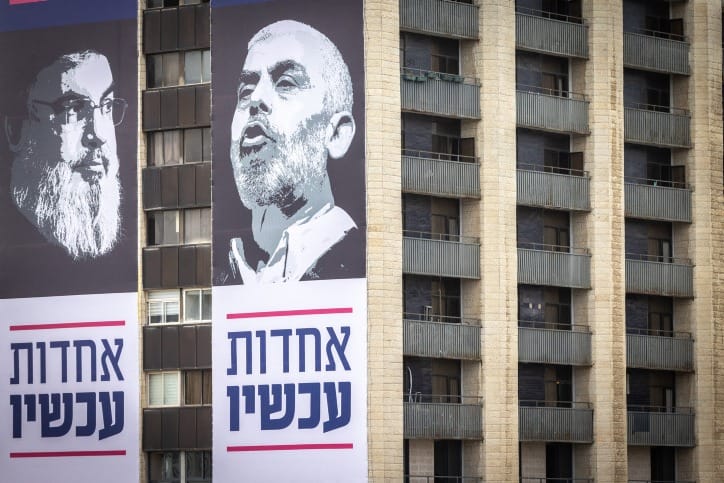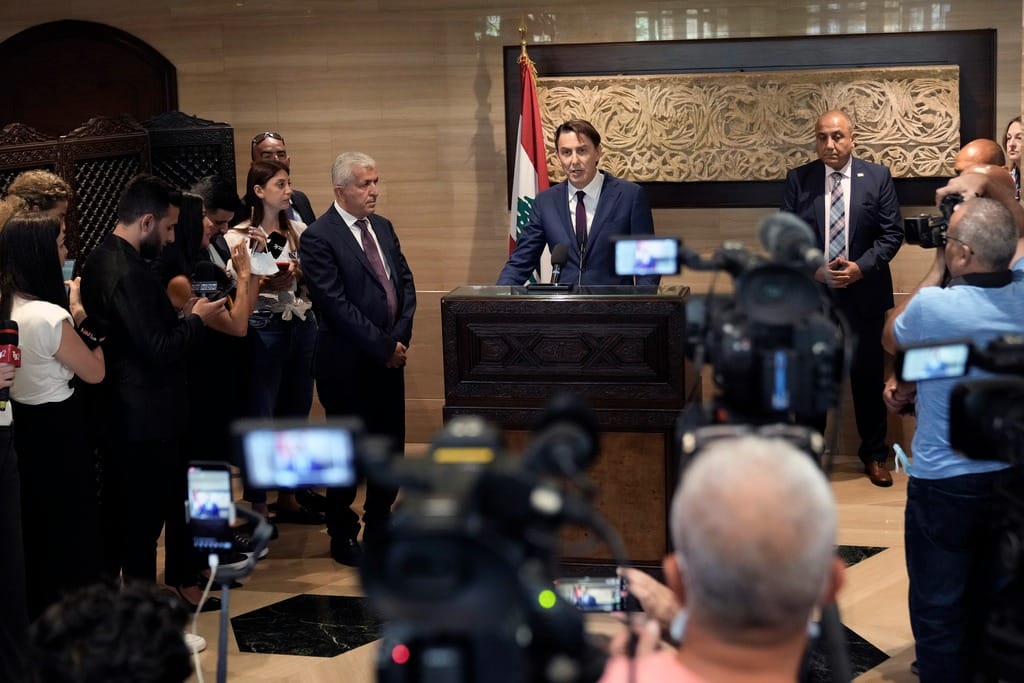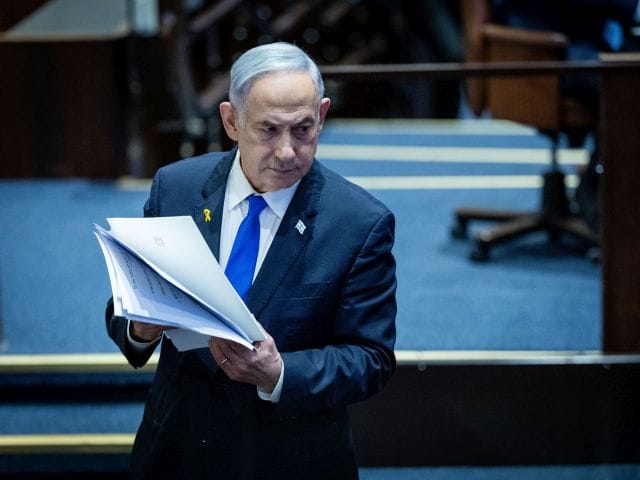Expert on Arab affairs Marianna Belenkaya talks on Hamas's plans to hand over the management of the civilian sector in the Gaza Strip to Fatah, the possibility of a full-scale war between Hezbollah and Israel, and the conflict between Netanyahu and the Biden administration over weapons halt.
This week, the region focused on US envoy Amos Hochstein's efforts to prevent the conflict between Israel and the Lebanese Hezbollah from escalating into a full-scale war. This coincides with another crisis in American-Israeli relations. Meanwhile, mediators continue working on a ceasefire in the Gaza Strip, which they believe will also reduce tensions on the Lebanese-Israeli border. In addition, the issue of "the day after the war" is being actively discussed. Hamas has shown increasing concern about this, with its leaders contemplating how to maintain their influence in Palestinian territories legally.
Hamas' plan is not to leave and to stay
Hamas is ready, after the end of the war, to hand over the management of the civilian sector in the Gaza Strip to Fatah, particularly in areas such as healthcare and education, but intends to retain control over all security-related issues. This was reportedly discussed at a meeting between representatives of the two Palestinian movements in Doha two weeks ago, according to Israel's Keshet-12 TV channel. The meeting was attended by Hamas' political bureau chief Ismail Haniyeh and Khalil al-Hayya, a deputy to Hamas's Gaza leader Yahya Sinwar. The representatives from Fatah were not disclosed. This information, which appeared on Thursday evening, has not yet been confirmed by Arab sources.
In Israel, Hamas' plans for "the day after the war" are explained as a hardening of Sinwar's positions: he feels like a victor, although the fighting continues. Arab media actively paint such a picture, including recounting articles from Israeli counterparts or quoting Israeli politicians. In particular, the words of IDF spokesperson Rear Admiral Daniel Hagari, spoken in an interview with Reshet-13 TV channel, have widely spread: "Talks about the possibility to destroy Hamas, to make it disappear, are just throwing dust in the eyes of the public." This is interpreted as an admission of the Israeli military's weakness.

At the same time, Hamas leaders understand that under any circumstances, no one will allow them to manage the Gaza Strip directly, let alone give them money for the reconstruction of civilian infrastructure. All potential sponsors of Gaza's future reconstruction—the United States, the European Union, and most importantly, the Arab monarchies of the Persian Gulf, including Qatar—have made it clear that such an option will no longer pass. Officially, all affairs will be conducted with the internationally recognized Palestinian Authority based in Ramallah.
The core of the Palestinian Authority is Fatah. After seizing power in the Gaza Strip in 2007, Hamas is not part of any PA structures. Moreover, Hamas, as well as the Islamic Jihad, were initially not members of the Palestine Liberation Organization, which is recognized as the official representative of the Palestinian people. The PLO, not the PA, is authorized to make all pivotal decisions. Currently, three structures are merged in the person of Mahmoud Abbas—he heads Fatah, the PA, and the PLO. However, this does not necessarily have to be one person.
Hamas is seeking reconciliation with Fatah, in part to be able to promote its appointees in the PA and PLO. Not coincidentally, one of the issues that traditionally arises in all negotiations on Palestinian national reconciliation is the inclusion of Hamas into the PLO. Fatah actively dislikes this, but its leaders cannot publicly oppose this process without taking responsibility for the failure of reconciliation. Nevertheless, it progresses very slowly with mutual accusations from both sides. However, as the day after the war approaches, it is clear that mediators will increase pressure on both Fatah and Hamas, especially Arab countries, as well as China and Russia.
The potential next step after the reconciliation of the two forces is holding elections – for the president, parliament, and the leadership of the PLO. According to a survey published in mid-June by the Palestinian Center for Policy and Survey Research, if parliamentary elections were held now, 40% of Palestinians would prefer Hamas, while Fatah would get half as much. 33% would not vote for either of them. If Marwan Barghouti, a Fatah member who is currently in an Israeli prison, is excluded from the presidential race, Ismail Haniyeh is the most likely next president of Palestine under all scenarios. The question is whether mediators will allow the Hamas leader to participate in the political process. The USA is currently opposed. However, Arab countries cannot publicly say "no," even if some do not want such a scenario.
Undoubtedly, Palestinian elections are still a long way off. However, the "day after the war" is actively discussed. Those who support the idea of Hamas's continued participation in political life, as well as those who see it as inevitable, are doing everything to ensure that the movement has this opportunity. This requires, among other things, that Hamas be seen as a party ready for a ceasefire and constructively working with mediators. Against this backdrop, in recent weeks, there have been reports that Egypt and Qatar are intensifying pressure on Hamas.
On Tuesday, Qatari Prime Minister and Minister of Foreign Affairs Mohammed bin Abdulrahman Al Thani met again with Ismail Haniyeh. Sources from the Times of Israel claim that Doha insists Hamas compromise and agree to changes in the ceasefire agreement proposal submitted last week. Israeli media also reported that sanctions against Hamas might be imminent. Whether this is true remains unclear. It has been reported over the past months that Qatar wants to close Hamas's political office in Doha, but this has not been confirmed. Mohammed Al Thani stated on Friday that the mediators are continuing their work, but there has been no progress yet.
At the beginning of the week, during hearings in Congress, the US Assistant Secretary of State for Near Eastern Affairs, Barbara Leaf, stated, "There's a cadre of political officials of Hamas in Doha — and boy do they squeeze them, I can assure you they squeeze them — But at the end of the day, there's one guy ten stories below the ground: a psychopath, messianic in his own belief that he has established himself in history, and [he believes that] there's a sunk cost of having lost thousands of fighters and carnage in Gaza." This was a reference to Yahya Sinwar, as well as the fact that Doha does not have influence over the military leadership of Hamas in the Gaza Strip. Previously, various media reported that the US sees the ideal endpoint of the war as the elimination of Sinwar, which would effectively write him off. However, the political leadership of Hamas and some local leaders, including in the Gaza Strip, might be hoping to survive and secure their place in the future Palestinian leadership.
The question of when and how the war in Gaza will end is crucial, as much depends on it for the entire region.
Mission: Impossible
This week, several Arab media outlets reported that the US is attempting to influence Hamas through the Lebanese Hezbollah. It is claimed that this was discussed during the US envoy Amos Hochstein's visit to Beirut.

He arrived there from Jerusalem and returned to Jerusalem afterward. Washington is making desperate efforts to prevent the conflict between Israel and the Lebanese movement Hezbollah from escalating into a full-scale war. The US fears that it could become directly involved in this confrontation, which could also lead to direct clashes with Iran, which has a direct influence on Hezbollah.
The US has repeatedly promised to assist Israel in the face of Iranian threats, and having fulfilled these promises in April, they intend to continue doing so. However, war benefits no one, mainly as it would not boost Joe Biden's ratings before the elections. Moreover, there are doubts in Washington about whether Israel can contain Hezbollah without significant losses.
According to CNN, the US is seriously concerned that in the event of a full-scale war, Hezbollah could deliver a devastating strike to Israel's air defense system, including the Iron Dome. Hezbollah has boasted that its drones were able to damage one of the Iron Dome batteries. The Israeli military has not confirmed this, but there is no doubt that Hezbollah possesses sufficient weaponry to inflict severe damage on Israel, nor is there any doubt that Israel has the means to respond.
While the parties exchange threats, Israel continues targeted assassinations of Hezbollah commanders, and its leader, Sheikh Hassan Nasrallah, responds with threats and promises Israelis many surprises. One such surprise was the video recording of strategic sites in Haifa and its surroundings. Hezbollah declares that other Israeli cities are also in its sights, and it does not intend to retreat from the Israeli border as demanded by mediators.
In this context, Amos Hochstein's mission took place. Experts believe that neither Hezbollah, Iran, nor Israel want a major war, but there are a few ways to retreat. Hezbollah promises the cessation of shelling Israeli territory if hostilities in the Gaza Strip end. In fact, the movement's leaders have become hostages to themselves, linking the Palestinian and Lebanese fronts against Israel into a single entity.
The United States, like France, which also acts as a mediator, has recently adopted Hezbollah's stance. However, negotiations for a ceasefire in the Gaza Strip are not progressing, and the confrontation on the Lebanese-Israeli border could cross red lines at any moment.
According to some Arab media, Hochstein brought a very tough message to Beirut, noting that there is very little time left to make decisions. According to a source from the Qatari site The Middle East Eye, in his meetings in Beirut, Hochstein warned Lebanese officials that Israel is preparing to start a limited offensive against Hezbollah and will receive US support if a diplomatic solution is not found soon. According to the source, Hochstein reported that Israel expects about five more weeks of intense fighting in the Gaza Strip, after which it will come down to individual targeted operations to eliminate high-ranking Hamas representatives, as well as operations related to attempts to return hostages. At that time, the Israeli military will focus its attention on the northern border.
The Middle East Eye notes that the harsh statements by the US reflect their deep disappointment that Hamas did not unconditionally accept Biden's ceasefire plan in the Gaza Strip. Other Arab media outlets say that there was no harshness in Hochstein's words, but they also confirm that there was a lot of discussion about Biden's ceasefire plan in the Gaza Strip. It is noted that the Lebanese refused to pressure Hamas. However, even Hezbollah does not have such leverage. If anyone can do something, it is Iran, but it has its own game and calculations. In any case, Tehran is currently busy preparing for the presidential elections.
The conflict between Netanyahu and the Biden administration
Another crisis in the relations between Israeli Prime Minister Benjamin Netanyahu and the Biden administration further complicates the situation. It arose following the Prime Minister's statement in which he described the US delay in ammunition supplies to Israel as "inconceivable." This refers to a batch of bombs that the US fears might be used in Rafah. However, this remains an isolated incident, and it has caused some offense in Washington, especially as, in recent days, the Biden administration managed to persuade two key Democrats in Congress to support an arms sale deal to Israel worth over $18 billion, which includes the supply of 50 F-15 fighter jets.

Against this backdrop, strategic consultations in Washington involving Israel's Minister for Strategic Affairs, Ron Dermer, and the head of Israel's National Security Council, Tzachi Hanegbi, were canceled. However, they eventually flew to Washington and met with American officials, but the discussions were not as extensive as initially planned.
Meanwhile, as reported by Axios, tensions between Netanyahu and the Biden administration are hindering diplomatic efforts to end the conflict between Israel and Hezbollah. There is concern that these tensions are being fueled by the US stalling on weapons deliveries. This escalation is also detrimental to resolving issues related to regional security. However, cooperation continues, and at the end of July, the Prime Minister of Israel is scheduled to speak in Congress. The region wants clarity on where things are heading, but no one knows now.















